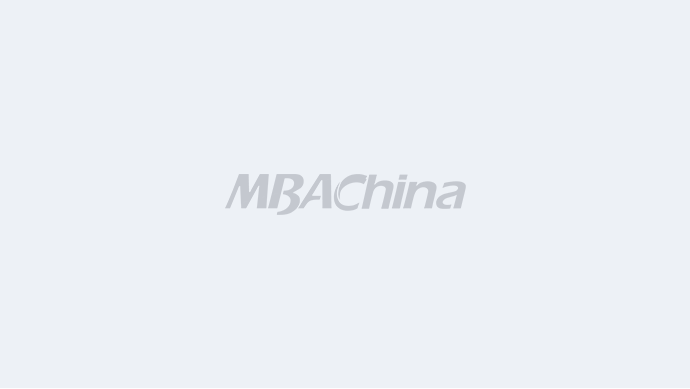Hypercompetition and Beating the Commodity Trap

April 25 2012. Shanghai – CEIBS this evening hosted Richard D'Aveni, the Bakala Professor of Strategy, Tuck School of Business at Dartmouth for an Executive Forum lecture. For CEIBS Executive Forum lecture series, senior executives, leading academics, and government officials are invited to give special lectures to the school community. In tonight’s information packed talk, Prof. D’Aveni expounded on the concepts of hypercompetition and commoditisation in today’s world.
CEIBS Distinguished Professor of Management and European Chair for Global Governance and Sino-European Business Relations, Dr. Helmut Schütte, gave a brief overview of Prof. D’Aveni’s significant accomplishments as he introduced him to the audience. Prof. D’Aveni has been listed as one of the top 50 management thinkers in the world in 2007, 2009, and 2011 by the Thinker’s 50, CNN, Forbes, the Harvard Business Review, The Times of London, and the Times of India. He has also advised or worked with the president or prime minister of two G-7 countries, the European Parliament, the French Senate, members of the Saudi Royal family, and the Vice President of Indonesia, as well as consulted with over 30 CEOs in the Fortune and Global 500 and over ten billionaire families on the Forbes list of The Wealthiest 500 in the World.
In this evening’s presentation Prof. D’Aveni began by explaining that hypercompetition has been a theme throughout his career. In a world of rapid change in regulations and technology, products have a quick life cycle and sustainable competitive advantage is impossible – particularly with increasing competition from China. The tried and true models, like SWOT analysis, will no longer work properly. Using an analogy of a tennis match, Prof. D’Aveni said that nowadays companies are not just focused on one tennis game, they are playing hundreds. Therefore, a traditional strategy based on pitting one’s strength against the weakness of one’s opponent is no longer effective – this type of strategy would simply allow the opponent to learn quickly and improve their skills.
Prof. D’Aveni said that in a hypercompetitive world, companies must think multiple steps ahead of rivals, and strategy should be focused on using one’s strength against the strength of competitors. He explained by elaborating on the following points:-
The Old Rules: Win by Reducing Rivalry (Porter Model)
Build Non-Competitive Industry Structures
l Barriers to entry – exclude competitors
l Reduce rivalry
Ø Avoid price wars
Ø Strength against weakness
Ø Proprietary technology
l Use power of monopoly
Ø Over buyer
Ø Over seller
l Oligopolistic Bargains
Ø Signaling Cooperation
Ø Avoiding Price Wars
Ø Avoid Frontal Attacks
Ø Strength against Weakness
l Retreat to Low Rivalry Markets
l Focus on Hard-to-Replicate Niches
Ø Service and Relationships
Ø Proprietary Technologies
Ø Brand Names and Premium Images
The old rules, argues Prof. D’Aveni, had taught an entire generation to be non-competitive.
Hypercompetition – A New Type of Competition
During his speech, Prof. D’Aveni used the automobile industry as an example of how the consumers’ definition of quality can change in a way that makes previous models obsolete. In the sixties, he said, consumers liked big, heavy cars. Then there was a shift in consumer preference and people began demanding smaller, more streamlined cars. At the same time, cars were going from less to more complex, with the addition of airbags, safety systems, automation, etc. Prof. D’Aveni stressed that in order to beat the commodity trap, manufacturers needed to predict what the next generations would demand, and how the definitions of quality would change.
In hypercompetition, Prof. D’Aveni said, one must out-manoeuvre one’s opponent by serving the customer better, one must compete to neutralise or make obsolete the opponent’s advantage at serving the customer, and one cannot indefinitely sustain one’s advantage. The new rules, he asserted, require companies to disrupt the status quo in order to reshape and reinvent the industry – there are two types of firms, he said, the disruptive and the dead.
The lecture closed after Prof. D’Aveni took some questions from the audience.
Writer: Rachael McGuinness
Editor: Charmaine N. Clarke
(本文转载自CEIBS ,如有侵权请电话联系13810995524)
* 文章为作者独立观点,不代表MBAChina立场。采编部邮箱:news@mbachina.com,欢迎交流与合作。
热门推荐
备考交流
最新动态
- 教育部原司长,任211党委书记 2024-05-06
- 新增硕士点来了!听说更容易上岸? 2024-05-06
- 热度猛升!双非院校到底值不值得考 2024-05-06
活动日历
- 01月
- 02月
- 03月
- 04月
- 05月
- 06月
- 07月
- 08月
- 09月
- 10月
- 11月
- 12月
- 05/04 报名 | “中国经济变局下的企业风险管理”复旦大学李若山教授公开课暨联合宣讲会
- 05/08 集赞赢取精美礼品 | 面试诀窍、备考经历、海外交换,报名5月8日面试圆桌派,用10个问题揭秘三位高分学长的备考秘籍!
- 05/11 报名 | “企业数据资产盈利的商业模式”复旦大学教授公开课暨项目招生说明会
- 05/12 招生工作|浙工大校园开放日暨MBA、MEM项目宣讲会通知
- 05/12 「复旦大学 EMBA 项目」与「复旦-台大 EMBA 项目」介绍会 | 活动预告
- 05/12 香港大学MBA大师级示范课 | 双剑合璧,对话未来,一起再飞跃!
- 05/17 限时抢位!长江商学院MBA项目5月北京体验课
- 05/18 5/18校园开放日,邂逅最美财大!2024上财商学院首场MBA/EMBA Pre-Sufer Campus Open Day
- 05/18 5月18日 | 全国首场中国商学院招生巡展暨2025招生政策发布会(北京站)重磅来袭!
- 05/18 5月18日 | 北京体育大学邀您参加中国商学院招生巡展暨2025招生政策发布会(北京站)
热门资讯
MBA院校号
-
最新动态:
考研倒计时2天|心之所向皆如愿














